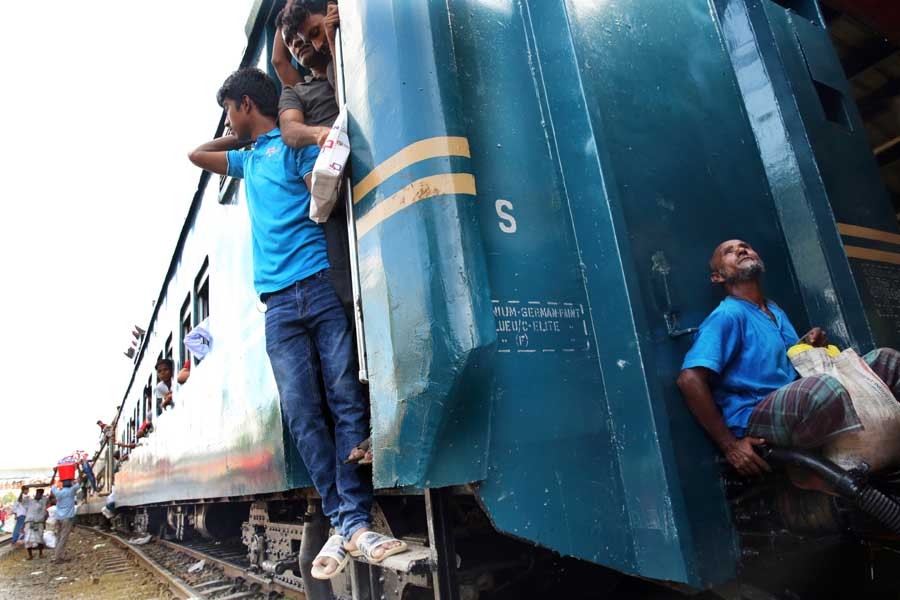Many people who travel between the capital and adjoining towns are increasingly using trains as a means to commute, an enquiry has found.
The reason behind the upsurge in train travel is the unmanageble traffic congestions on city roads and in adjacent areas.
Over 100,000 people are using trains on Dhaka-Airport-Tongi-Gazipur route, while 140,000 on Dhaka-Narayanganj route every day, Director General of Bangladesh Railway Md Amjad Hossain said while talking to UNB.
But, he said, the number of trains are still low as per the growing number of their users who often use trains to come from outside Dhaka city and use that again to go back home. "We're planning to double the number of shuttle trains by next year," the official said.
Upon inspection, it was seen that the number of train users has surged sharply in the last couple of months, giving the authorities a tough time to tackle the crowd.
Amjad Hossain said those who live outside Dhaka but have to come to the capital for work prefer to use trains as those are less hazardous and cheaper compared to road transportation. The need for saving time is the biggest reason why they choose trains over buses, he added.
The director general also said the journey time from Dhaka to Narayanganj or Gazipur is an hour and half now, which is used by lakhs of people, but they do not have adequate trains to meet the demand.
Over 106 trains operate on the Dhaka-Airport-Tongi-Gazipur, catering to at least 1,000 commuters per train, which are used to travel to destinations like Mymensingh, Jamalpur, Dinajpur, Kishoreganj and Sylhet. People now come to Dhaka with standing tickets riding in them.
Amjad Hossain also said projects are underway to convert Dhaka-Tongi route from the double lane to four-lane one while Tongi-Joydebpur from single-lane to double-lane ones. The conversion project will finish in two years' time, which will also help increase the number of trains.
He observed that people from Narsingdi and Mymensingh also come to Dhaka every day for work and go back again.
"With the growing urbanisation, many satellite towns will be created, which will increase more demand for such commuter trains," he mentioned, adding that the government should take lessons from foreign railway systems to meet those demands.
Railways Minister Mujibul Haque told UNB that his ministry has already taken initiatives to meet the growing demand for commuter trains and relevant expansion projects.
Harun Dhali, a daily commuter from Gazipur to Dhaka, said he prefers trains for his journey as it helps him avert traffic jam of 3-4 hours a day.
But, he said, the Dhaka-bound trains coming from other districts and cities often come filled up, forcing many like him to remain standing throughout the journey. "It would have been wonderful had there been more trains."
Another commuter, Towhidul Alam, who travels from Narayanganj, said trains are quicker and more secure, and wished if there was a train every half an hour from his city.
Russel, a working man, said he travels by train from the Airport to Kamlapur as it takes only 40 minutes, as against two hours by bus. But the huge crowd waiting to get inside incoming trains is becoming a demotivator for some.


